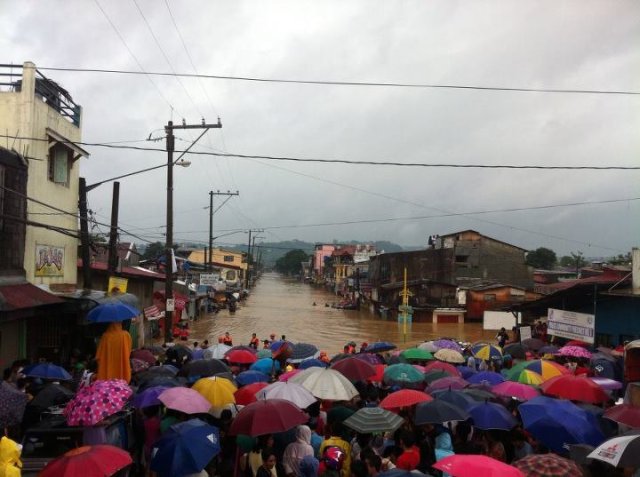
"The situation is pretty grim," Reihana Mohideen told Green Left Weekly on August 8 from the frontline of devastating floods that have submerged half of Manila over the last few days. "It's still raining hard and hard to get around."
"This is another painful reminder of the global climate change crisis and the pain is being felt most by the poor and most oppressed."
Mohideen was part of a team delivering basic supplies, collected at the Partido Lakas ng Masa (PLM) national office, to urban poor and working-class comunities. These included canned goods, instant noodles, milk, coffee, sugar, biscuits, bread, basic medicines and towels. PLM is one of a number of progressive people's organisations doing relief work with very limited resources.
"Today we tried to get to the evacuation centre in Marikina. There were supposed to be 1000 families at the evacuation centre. But we never got there as we had to attend to the affected communities along the way.
"We've just left Barangay Industrial Valley Complex in Marikina, where we were delivering lugaw [rice porridge]. Still flooded here. People are cleaning out rubbish that has collected near their homes. Some said that they hadn't eaten since last night and were quite angry that we got there only today."
"We are appealing for aid and volunteers (to help distribute aid) to come directly to our office at: #13 Rigor St., Brgy. Masagana, Proj. 4, QC."
The Pagkakaisa ng Manggagawa sa Transportasyon (PMT) a union which organises tricycle drivers who provide short-distance transport (and are some of the most marginalised workers often living in urban poor squatter settlements along riverbanks, under bridges or next to rubbish dumps) sent out this appeal for solidarity:
"In Marikina City, the river water level breached and continues to be above critical level. Due to this, more than 5,000 families have been relocated to evacuation centers.
"Our members from the tricycle sector in the City who rely on day-to-day work have not been spared. In fact the 2,000 families who depend in these three-wheeled livelihood have been doubly hit. While floods have forced them out of their homes, floods have also denied them work and income. Tricycles soaked under water will take days before they are operated again.
"It is in this light that we seek your kind intervention for our members. We would like to request for relief goods which can help them cope and survive these trying times."
These are the worst floods since catastrophic floods in 2009 which killed more than 460 people. The death toll from the current floods is 56 but expected to rise. Already more than a quarter of a million people have fled their homes.
"These massive floods are caused not by a typhoon but by a monsoon rain," Mohideen explained. "The flood waters though have reached the same levels or even exceeded that during typhoon Ondoy in 2009."
"This emerging pattern of increasingly extreme weather conditions has to be related to climate change, and those suffering the worst impact of it are the poor. The lack of adequate housing, drainage and canals, water catchments to collect water, hit the urban poor who are more than 80% of the population in Metro Manila, especially hard. This, combined with lack of information and awareness means the adaptation mechanisms of the population is extremely weak.
"We are doing what we can but the only way that disasters on this scale can be mitigated is through the state, or government intervention. For example, today we couldn't reach some of the communities from where our organisers were appealing for assistance because of the floods. We need boats and helicopters to get out. But for this we need a government committed to the interests of the people. A government that is based on the protection of elite rule will not be able to effectively handle disaster response and such crises.
"We know how effectively Cuba handles disaster response. It has been identified as a world's best practice by the UN. The Philippine government is far cry from the Cuban standard."
Through the people's organisation, Transform Asia, an international appeal for emergency aid has been issued.
Donations can be made in three ways:
1. For those with PayPal accounts you can send donations to partidolakasngmasa@gmail.com via PayPal and it will be sent directly to the Transform Asia flood appeal account.
2. Go to the Transform Asia website http://transform-asia.org/transform-asia-appeal/ and press the "donate" button.
3. Transfer directly to:
Transform Asia Gender and Labor Institute
Account No. 304-2-30400456-2
Swift Code: MBTCPHMM
Metro Bank, Anonas
Branch: Aurora Blvd, Project 4
Quezon City, Metro Manila, Philippines
Email: transform.asia1@gmail.com
Mobile No. +63 (0)9088877702

Marikina River valley in flood at Batasan Bridge, San Mateo. Photo by Dave Llavanes Jr.

Flooding in Marikina. Photo by Dave Llavanes Jr.

Residents of Libis Malaya in Barangay Malanday, Marikina, remaining with their submerged houses. Photo courtesy of Ryan Chua

Photo by Bimbo Moreno.

Sorting emergency food supplies at the PLM national office in Manila.

Evacuation Centre, Sampaguita, Malanday, Marikina.

PLM on way to delivering flood relief supplies to people in Lupang Arenda, Tay Tay.

PLM delivering flood relief supplies to people in Lupang Arenda, Tay Tay.

The people in Lupang Arenda, Tay Tay were happy to get some supplies.

The people in Lupang Arenda, Tay Tay were happy to get some supplies as official aid did not begin to arrive until August 9.



While the rain eased on August 9, much of Manila remained under water.